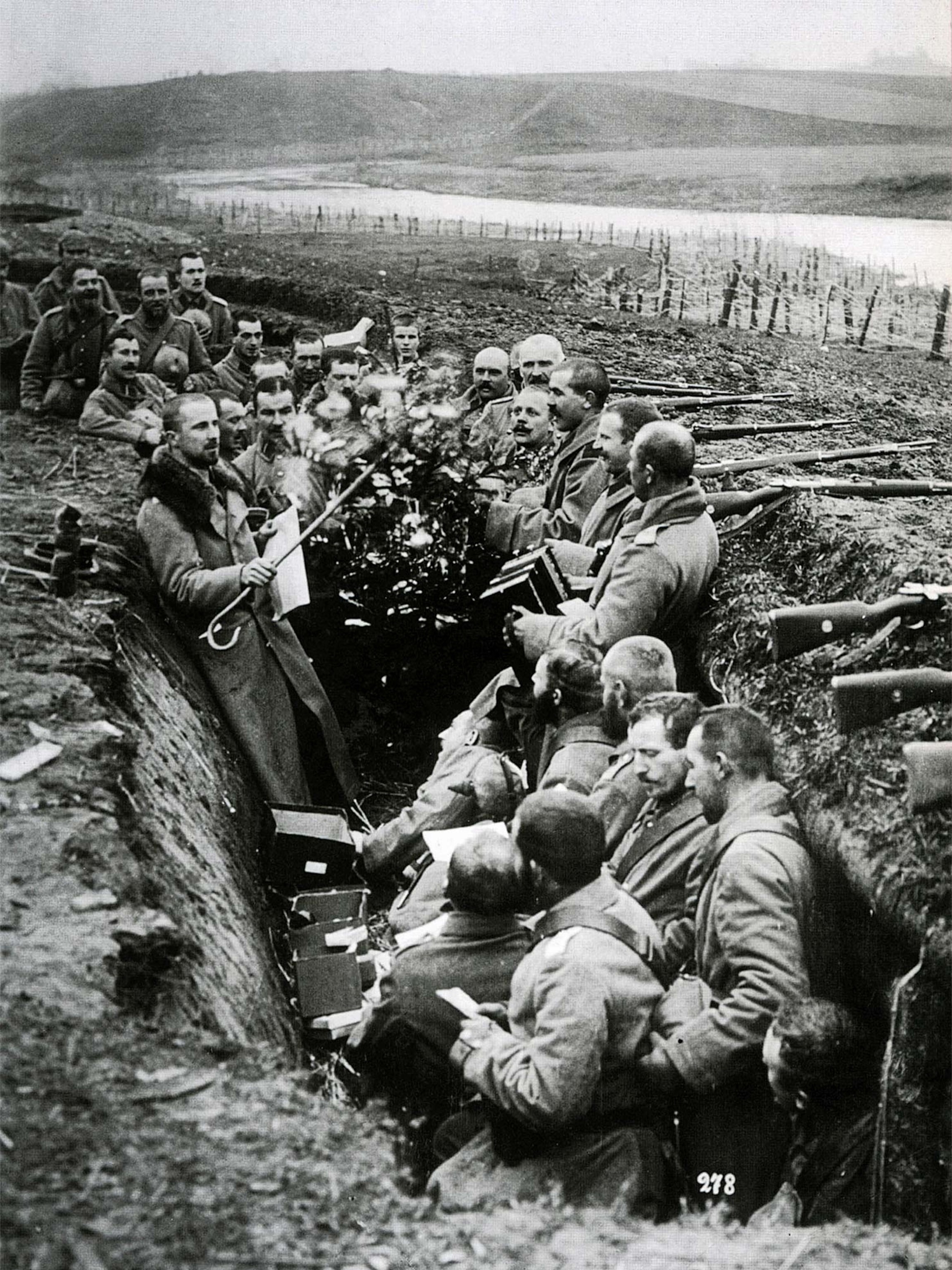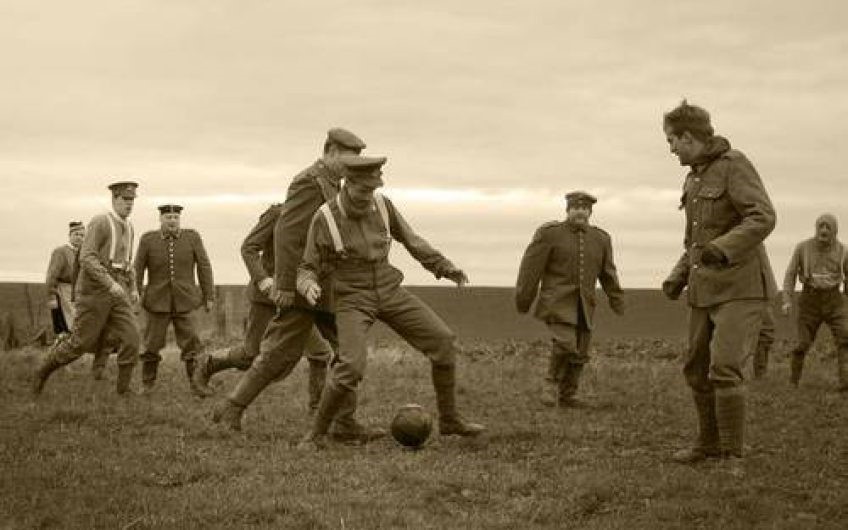The First World War and the Christmas Truce of 1914

The Christmas Truce which occurred during the First World War in 1914 was a unique event in the conflict in which British and German soldiers fighting against one another in the trenches of the Western Front in France and Belgium laid down their guns on Christmas Eve and Christmas Day with some of them exchanging gifts with one another singing carols and even in some instances playing football. Before December 1914, the war on the Western Front had been raging since August, although by the middle of September it had developed into “stalemate” along lines of trenches facing each other with “no man’s land” dividing them and the British and Germans suffering heavy casualties as a result of machine gun fire and the use of heavy artillery weapons. The view that the war would “all be over by Christmas”, which was a common belief on both sides during August and September and which had led to so many men following the call to join the armed forces made by their governments, had now disappeared.
 By Christmas, the soldiers on both sides were exhausted and weary of the constant warfare, with many of them having signed up in the early months & being excited by the opportunity to serve their country but now wanting to return home to their families and leave the damp and cold trenches where there was constantly the threat of having to go “over the top” into no man’s land and face almost certain death from enemy fire. The truce was spontaneous, and it began with German soldiers beginning to decorate their trenches with simple Christmas trees and to light candles and sing carols, and there were even some reports that the Germans began to shout across no man’s land, wishing the English “Merry Christmas” in broken English, and although British troops were initially hesitant they eventually began to sing Christmas carols in response being swept along by the mood of the Germans and thinking of loved ones back at home.
By Christmas, the soldiers on both sides were exhausted and weary of the constant warfare, with many of them having signed up in the early months & being excited by the opportunity to serve their country but now wanting to return home to their families and leave the damp and cold trenches where there was constantly the threat of having to go “over the top” into no man’s land and face almost certain death from enemy fire. The truce was spontaneous, and it began with German soldiers beginning to decorate their trenches with simple Christmas trees and to light candles and sing carols, and there were even some reports that the Germans began to shout across no man’s land, wishing the English “Merry Christmas” in broken English, and although British troops were initially hesitant they eventually began to sing Christmas carols in response being swept along by the mood of the Germans and thinking of loved ones back at home.

On Christmas Eve itself, unbelievably, soldiers from both sides along sections of the front line began to get out of the trenches & cross into no man’s land, which was an incredibly brave course of action with enemy machine guns facing them, which could have opened fire at any moment but which, at this time, did not take place leading to more fraternisation between individuals on both sides. Once the soldiers were out in no-man’s land, they exchanged greetings with one another even though in many cases they could understand each other very well and there have been reports that they shook hands and shared some of their food rations and cigarettes with the British giving the Germans some Christmas pudding and the Germans offering cigars and schnapps. There were even instances of showing each other pictures of their wives and children which they kept with them, indicating that although they were from different countries they had a great deal in common which united them.

Possibly the most famous part of the Christmas Truce were the football matches that some soldiers played in no man’s land, with there being several of these taking place in different parts of the frontline, with many of these being spontaneous, informal and quiet short rather than being organised, but they were a reflection of the shared humanity between men from different countries who wanted to put to one side the horrors of war. One German soldier later recalled the events, stating “I remember the silence, the sudden quiet of the guns and the singing. The next day, we were out there walking and talking with the Germans and some of us played football in no man’s land. It was strange, really, to have a game of football with men who only the day before had been trying to kill us”.
 It is important to remember, however, that the truce was not universal along the whole of the front line and there were still areas along the front where fighting continued with commanding officers on both sides concerned that the truce would undermine their authority and the morale of the soldiers fighting in the war, and they were quite anxious that it should be brought to an end as quickly as possible. The truce where it took place did not last for a long time and in most cases, within one or two days it came to an end with soldiers being forced back into their trenches and fighting on the front line resuming. It did, however, have a lasting impact and for those soldiers who were involved it proved to be a very emotional experience as it raised questions about the futility of war & what they were fighting for, which became stronger as time passed.
It is important to remember, however, that the truce was not universal along the whole of the front line and there were still areas along the front where fighting continued with commanding officers on both sides concerned that the truce would undermine their authority and the morale of the soldiers fighting in the war, and they were quite anxious that it should be brought to an end as quickly as possible. The truce where it took place did not last for a long time and in most cases, within one or two days it came to an end with soldiers being forced back into their trenches and fighting on the front line resuming. It did, however, have a lasting impact and for those soldiers who were involved it proved to be a very emotional experience as it raised questions about the futility of war & what they were fighting for, which became stronger as time passed.

There would be no repeat of the Christmas Truce in 1915, 1916 and 1917 as commanding officers in both the British and German armies were more prepared for such occurrences in subsequent years, with soldiers being ordered not to fraternise with the enemy even on 25th December. By the end of the war, the events of 1914 seemed a very distant event, although to those soldiers involved it would never be forgotten. In spite of the Christmas Truce of 1914, which happened 110 years ago, this event, or rather, series of events, has created a lasting consciousness amongst many people, demonstrating the potential for kindness, understanding and hope even in the most difficult circumstances. Even though it was not sustained beyond one or two days and did not prevent the resumption of the conflict which would last for nearly another four years, it is still important that it is still remembered because of the values it represented at the time and which remain relevant to us today.
Mr Goodall, Head of History and Politics
